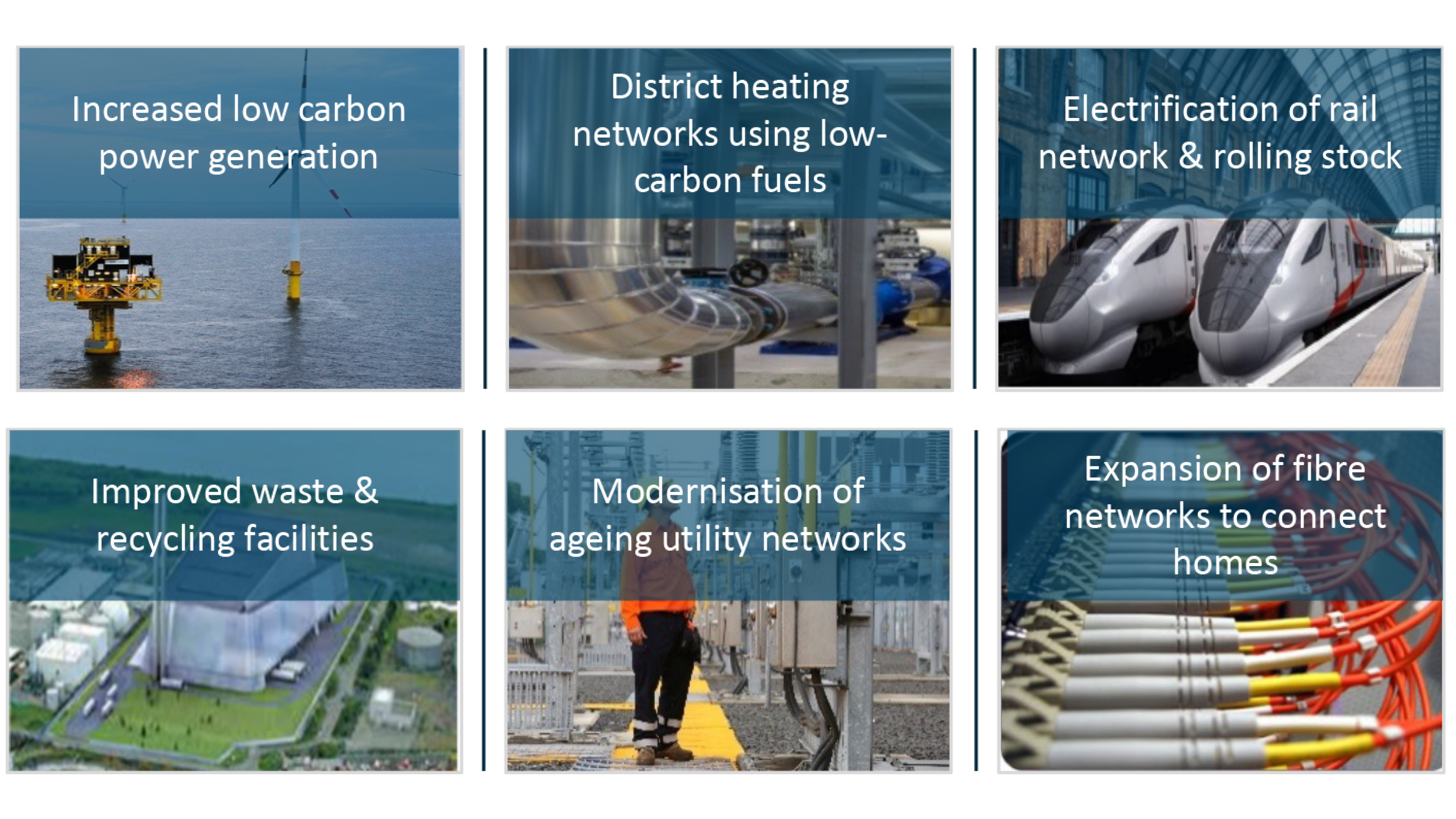Integrating ESG analysis into infrastructure debt investments

There is clear evidence that society needs to invest in a lower carbon future and ensure future growth is attained more sustainably. Concurrently, the effects of the pandemic on many companies and government balance sheets have been severe. This has brought about a recognition that other sources of financing from institutional capital, such as long-term retirement savings, can play a critical role in achieving the transition needed to avoid the predicted effects of climate change. We believe this is creating attractive investment opportunities for pension funds to finance this transition in infrastructure through debt.
In response to the pandemic, developed market economies announced almost US$9 trillion1 in government spending to ‘build back better’, with infrastructure spending being a major focus. This is a supportive backdrop for the asset class, and debt markets are increasingly being used to fund the development and expansion of low carbon fuel sources (such as wind, solar, and hydro) and energy efficiency investments (such as the electrification of transportation, and smart metering). We believe these infrastructure assets will play a critical role in making the economy more sustainable while also delivering secure yield for investors.
Sustainability themes driving infrastructure debt issuance

To reinforce the benefits of sustainable outcomes, we think there are three key ESG related considerations investors should keep in mind when approaching this opportunity and by doing so, help maximise the impact of their capital:
1) Look below the surface
To successfully navigate the spectrum of investments seeking capital, we believe investors need to integrate an in-depth analysis of environmental, social and governance (ESG) issues into their screening and due diligence processes. Choosing a “sustainable” sector and indiscriminately allocating capital is not enough. Even though the sector will benefit from a sustainable theme like the energy transition, not every investment within the sector will successfully deliver on return, risk and ESG objectives. Therefore, a disciplined investment approach which integrates material ESG risk considerations is required.
Analysing ESG factors is not just about investing in greener or more sustainable assets, it is also a key element of managing investment risk and protecting and enhancing the value of long-lived assets. This is because poor practices in areas such as employee welfare, consumer protection, environmental management and corporate governance pose measurable risks to the viability of a business, and the return delivered by any investment.
For example, we have scrutinized a biomass fired power plant that was genuinely producing energy from renewable sources but the method used had some questionable elements. In particular, the company was shipping millions of tonnes of wooden pellets from the US to the UK each year to use as fuel, and the shipping of that fuel source would have a material carbon footprint. From an ESG perspective, this was unsatisfactory due to the impact on US forest resources and the sheer distance that the fuel was travelling before being utilised.
To be more environmentally friendly, bio-mass companies can use locally sourced fuel that is easy to cultivate. For example, another UK bio-mass company processes 80,000 tonnes of maize and 280,000 tonnes of other feedstock per annum that is locally grown and supplied by another company within the same corporate group. The company coordinates farming operations (sourcing land, farming, harvesting) and logistics operations for the group, including the disposal of digestate to agricultural land. This means the group has a closed loop, fully vertically integrated business model that reduces traditional operational risks, while helping to maximise operational efficiency and financial returns.
2) With debt investing, focus your influence during due diligence
It is no secret that equity investors can exert more influence on a business throughout the life of an investment than debt investors. But the strength in debt investors’ approach comes from anticipating this dynamic and using the negotiations that happen during due diligence to ensure ESG issues are addressed.
Infrastructure debt investors are increasingly seeking to work with asset owners who are willing and able to provide reporting on ESG related issues, such as emissions, health and safety and environmental impacts, to name a few. This reflects the growing importance of selecting to lend to experienced asset owners in each industry, and those who understand the importance of ESG dynamics to both debt and equity investors. Increasingly, we are seeking to partner with like-minded debt investors that are able to use ESG criteria and reporting as a key point in loan negotiations.
In a recent deal involving a natural gas related infrastructure asset in the US, the loan terms were negotiated so that the borrower was required to report CO2 emissions data on a quarterly basis as part of the operating reports, and to design and implement an agreed Health and Safety Program where there previously was none.
These requirements provided the lenders with the ability to monitor the company and its commitment to emissions reduction and worker safety on an on-going basis. They also provided the company with a better understanding of their businesses which is good for the business, staff, shareholders and other stakeholders.
This is breaking new ground for debt investors who have traditionally had very little ability to influence companies during the life of their investments. Looking forward, debt investors may be able to play a greater role in influencing companies because assets need to be refinanced and debt holders are a providers of capital. This gives them the ability to influence outcomes by withholding capital, or changing the cost of capital.
3) The importance of ESG reporting
For investors to look below the surface more clearly, there is a need for borrowers to provide richer data on ESG metrics. There is a hunger for reporting to understand how investors’ capital is performing from an ESG perspective. The surge in demand for investment products aligned with sustainability objectives has placed enormous pressure on borrowers to produce metrics and reports that can demonstrate their ESG credentials. This is a very important and sometimes onerous task, particularly for smaller issuers who are more resource constrained.
As we are all pulling towards common objectives when it comes to sustainability, it is natural to collaborate and for industry standards to be created around how we measure and report ESG related metrics. This standardisation can reduce the burden on borrowers and make interpretation easier for investors. IFM is part of an emerging consortium of infrastructure debt managers seeking to create a standardised ESG covenant package for infrastructure debt issuers to adhere to2. This is an effort to set “best practice” for borrowers when reporting on ESG factors and help facilitate compliance with ESG disclosure regulations across various jurisdictions, including impending regulation in the UK.
We have also observed that as equity and debt issuers are increasingly focused on ESG, borrowers are becoming better at reporting on their own. So there are reasons to be positive about the trend towards more detailed and harmonious reporting, but we also believe we should not let the perfect be the enemy of the good. In that vein, we feel there is an opportunity to work with borrowers who have strong ESG practices as they create standards for measurement and reporting.
Looking ahead
We are excited about the growing spectrum of investments and evolving ESG awareness we see contributing to sustainable themes in infrastructure debt markets. This evolution will support the transition of essential infrastructure and the creation of new, lower carbon solutions for our future.
But even in industries with clear sustainability benefits, like renewable energy, it is still important to focus on ESG fundamental analysis to uncover those investments which can deliver both attractive risk adjusted returns and a positive ESG outcomes versus those where green credentials are shallow.
The market is moving quickly, as we all seek to meet the world’s ambitious climate change targets. We look forward to being part of this solution by working with our investors and debt issuers together, helping to facilitate the transition in infrastructure to support a more sustainable future for us all.
Important Disclosures
The following disclosure applies to this material and any information provided regarding the information contained in this material. By accepting this material, you agree to be bound by the following terms and conditions. The material does not constitute an offer, invitation, solicitation, or recommendation in relation to the subscription, purchase, or sale of securities in any jurisdiction and neither this material nor anything in it will form the basis of any contract or commitment. IFM Investors (defined as IFM Investors Pty Ltd and its affiliates) will have no liability, contingent or otherwise, to any user of this material or to third-parties, or any responsibility whatsoever, for the correctness, quality, accuracy, timeliness, pricing, reliability, performance or completeness of the information in this material. In no event will IFM Investors be liable for any special, indirect, incidental, or consequential damages which may be incurred or experienced on account of a reader using or relying on the information in this material even if it has been advised of the possibility of such damages.
Certain statements in this material may constitute “forward looking statements” or “forecasts”. Words such as “expects,” “anticipates,” “plans,” “believes,” “scheduled,” “estimates” and variations of these words and similar expressions are intended to identify forward-looking statements, which include but are not limited to projections of earnings, performance, and cash flows. These statements involve subjective judgement and analysis and reflect IFM Investors’ expectations and are subject to significant uncertainties, risks, and contingencies outside the control of IFM Investors which may cause actual results to vary materially from those expressed or implied by these forward-looking statements. All forward-looking statements speak only as of the date of this material or, in the case of any document incorporated by reference, the date of that document. All subsequent written and oral forward-looking statements attributable to IFM Investors or any person acting on its behalf are qualified by the cautionary statements in this section. Readers are cautioned not to rely on such forward-looking statements. The achievement of any or all goals of any investment that may be described in this material is not guaranteed.
Past performance does not guarantee future results. The value of investments and the income derived from investments will fluctuate and can go down as well as up. A loss of principal may occur.
An infrastructure debt investment is subject to certain risks including but not limited to: local, national and international economic conditions; the supply and demand for services from and access to infrastructure; the financial condition of users and suppliers of infrastructure assets; changes in interest rates and broader credit market conditions which may render the purchase, sale or refinancing of infrastructure debt assets difficult or impractical; changes in environmental and planning laws and regulations, and other governmental rules; environmental claims arising in respect of infrastructure acquired with undisclosed or unknown environmental problems or as to which inadequate reserves have been established; changes in energy prices; changes in fiscal and monetary policies; negative economic developments that depress travel; uninsured casualties; force majeure acts, terrorist events, under insured or uninsurable losses; and other factors beyond reasonable control.
Investing based on sustainability/ESG criteria involves qualitative and subjective analysis. There is no guarantee that the determinations made by the adviser will align with the beliefs or values of a particular investor. Companies identified by an ESG policy may not operate as expected and adhering to an ESG policy may result in missed opportunities.
This material may contain information provided by third parties for general reference or interest. While such third-party sources are believed to be reliable, IFM Investors does not assume any responsibility for the accuracy or completeness of such information. This material does not constitute investment, legal, accounting, regulatory, taxation or other advice and it does not consider your investment objectives or legal, accounting, regulatory, taxation or financial situation or particular needs. You are solely responsible for forming your own opinions and conclusions on such matters and for making your own independent assessment of the information in this material. Tax treatment depends on your individual circumstances and may be subject to change in the future. This material is confidential and should not be distributed or provided to any other person without the written consent of IFM Investors.
Australia Disclosure
This material is provided to you on the basis that you warrant that you are a “wholesale client” or a “sophisticated investor” or a “professional investor” (each as defined in the Corporations Act 2001 (Cth)) to whom a product disclosure statement is not required to be given under Chapter 6D or Part 7.9 of the Corporations Act 2001 (Cth). IFM Investors Pty Ltd, ABN 67 107 247 727, AFS Licence No. 284404, CRD No. 162754, SEC File No. 801-78649.
Netherlands Disclosure
This material is provided to you on the basis that you warrant that you are a Professional Investor (professionele belegger) within the meaning of Section 1:1 of the Dutch Financial Supervision Act (Wet op het financieel toezicht). This material is not intended for and should not be relied on by any other person. IFM Investors (Netherlands) B.V. shall have no liability, contingent or otherwise, to any user of this material or to third parties, or any responsibility whatsoever, for the correctness, quality, accuracy, timeliness, pricing, reliability, performance, or completeness of this material.
United Kingdom Disclosure
This material is provided to you on the basis that you warrant that you fall within one or more of the exemptions in the Financial Services and Markets Act 2000 (“FSMA”) [(Financial Promotion) Order 2005] [(Promotion of Collective Investment Schemes)(Exemptions) Order 2001, or are a Professional Client for the purposes of FCA rules] and as a consequence the restrictions on communication of “financial promotions” under FSMA and FCA rules do not apply to a communication made to you. IFM Investors (UK) Ltd shall have no liability, contingent or otherwise, to any user of this material or to third parties, or any responsibility whatsoever, for the correctness, quality, accuracy, timeliness, pricing, reliability, performance, or completeness of the information in this material.
Switzerland Disclosure
This Information is provided to you on the basis that you warrant you are (i) a professional client or an institutional client pursuant to the Swiss Federal Financial Services Act of 15 June 2018 ("FinSA") and (ii) a qualified investor pursuant the Swiss Federal Act on Collective Investment Schemes of 23 June 2006 ("CISA"), for each of (i) and (ii) excluding high-net-worth individuals or private investment structures established for such high-net worth individuals (without professional treasury operations) that have opted out of customer protection under the FinSA and that have elected to be treated as professional clients and qualified investors under the FinSA and the CISA, respectively.
1 As measured by the Advanced Economies in the G20. https://www.imf.org/en/Topics/imf-and-covid19/Fiscal-Policies-Database-in-Response-to-COVID-19
2 https://giia.net/feedback-welcomed-on-new-esg-covenant-package/
Meet the authors
Related articles

Infrastructure Horizons 2025: How emerging trends in infrastructure will change the world

Investing in Australia: Accelerating industry super investment and growing Australia’s housing supply


